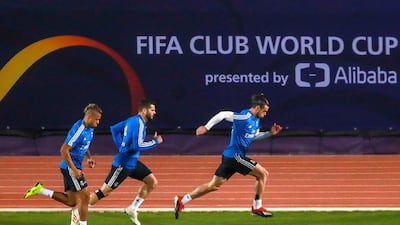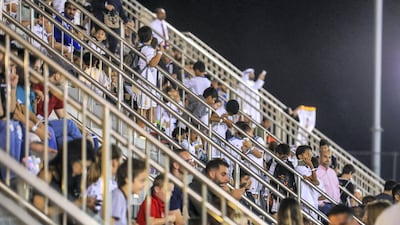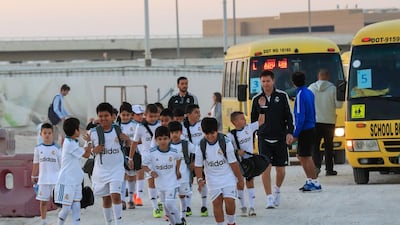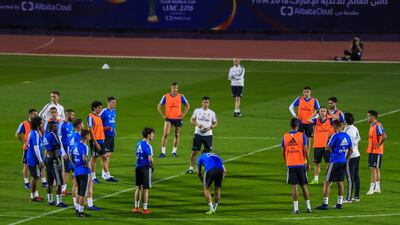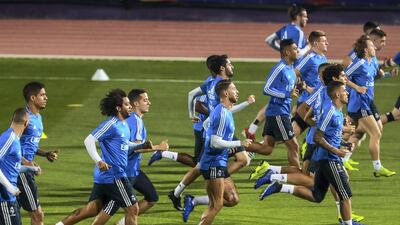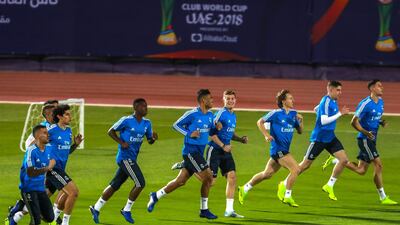The thirteenth manager of Real Madrid in the 16 years that the club's president, Florentino Perez, has been hiring and firing can have no illusions about the fragile nature of the job.
Santiago Solari, who guides the European champions and Fifa Club World Cup holders into their semi-final at Zayed Sports City on Wednesday, knows he is in the post partly by default, at short notice and is dispensable.
Solari is well prepared, though, for everything his position entails. His experience of the Real dressing room as a player educated him in the politics of the club, its hierarchies and what it takes to win over a demanding fan base. Solari was a fine, artful footballer, but he had to be patient at times. He was often the thirteenth man in an 11-man sport.
_____________
More from Fifa Club World Cup:
John McAuley: How Al Ain can stun River Plate to reach the final
Gallery: Real Madrid arrive in Abu Dhabi ahead of challenge for fourth title
Andy Mitten: Real Madrid arrive in Abu Dhabi for Fifa Club World Cup in disarray
_____________
“The highest-class substitute at the club,” is how Jorge Valdano, a former director of football at Real, described Solari in the years when his fellow Argentine was jostling for midfield positions with a superstar trio – Zinedine Zidane, Luis Figo and David Beckham.
Then there was the left wing, Solari’s natural zone, which was patrolled by the flying full-back, Roberto Carlos, and the front positions taken by the Brazilian Ronaldo and the prolific Raul Gonzalez.
That stellar cast-list had the Real Madrid of the early 2000s nicknamed "Los Galacticos", a glamorous collection of players eagerly acquired at record fees by Perez in the first of his two spells as president. Solari stood out in their company for several reasons.
First, there was his talent, which, although he made over half his 208 Madrid appearances from the bench, was good enough that he had a vital part, from the starting XI, in perhaps the most important goal of the Galactico era.
It was Solari who played the superb, measured pass that set up Roberto Carlos’s cross for Zidane’s arching volley to win the 2002 Champions League final against Bayer Leverkusen.
There was his intelligence, always vivid in his distribution of the ball, and obvious off the field. It is reported that Perez, who gained the presidency in the summer of 2000, the same time Solari joined Real from Atletico Madrid, remarked of him: “He thinks too much for a footballer,” and considered him the sharpest trade unionist in a dressing-room full of forceful personalities.
Many of Solari's teammates considered him an intellectual for his avid reading; some still talk about their awe and surprise at seeing him clutching a collection of Nietzsche essays.
Solari grew up with football, the son and nephew of players who earned a living from the game in Argentina. He was a good scholar, and completed his higher education in the US, which is where he perfected his spoken English.
His long playing career – which took in 11 caps, spread over six years, for Argentina – took him far and wide. Having handled the delicate jump from Atletico to Real, he moved to Inter Milan in Italy, where he won Serie A titles to go with his Liga gold medals, and he played in a 2009 Club World Cup semi-final in Abu Dhabi for the Mexican side Atlante. His last stop, aged 34, was with Penarol in Uruguay.
But the club perhaps closest to his heart is River Plate, and if his Madrid and the River – where Solari made his senior playing debut as a 19 year old – are to meet in the final this weekend, it will be especially resonant for the Real manager.
He was once a teammate of River Plate’s current director of football, Enzo Francescoli, and regarded him as an idol, as did Zidane, who had watched Francescoli playing for Marseille as a boy.
Like Zidane, who was abruptly promoted to Real manager just under three years ago and went on to win three Champions League titles, Solari came up from coaching the club’s feeder team, initially as a stopgap. He replaced the sacked Julen Lopetegui in October, and has fared well enough to be approved by Perez until the end of the season.
But it has not been easy. Solari does not have the superstar’s weight of approval that Zidane carried into the post. He does not have Cristiano Ronaldo’s goals to rescue Real in awkward moments.
He has heard the boos of the Bernabeu already, in defeats and even in limp victories. He may have been the ideal 12th or 13th man on the bench when he was a player, but he knows that some of his current charges – notably Isco – are not so comfortable starting as a substitute.
For the urbane, sophisticated Solari those are just a few of the challenges. A first trophy, one as prestigious as the Club World Cup, would feel immensely soothing.
